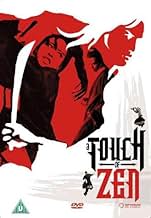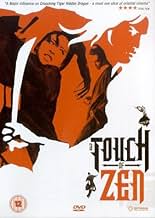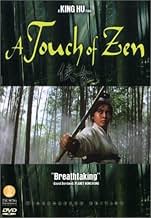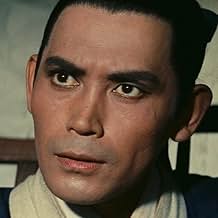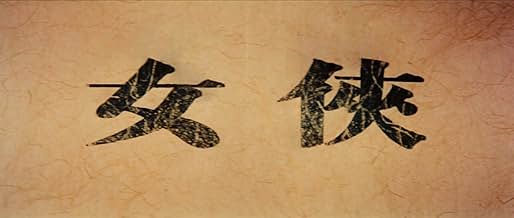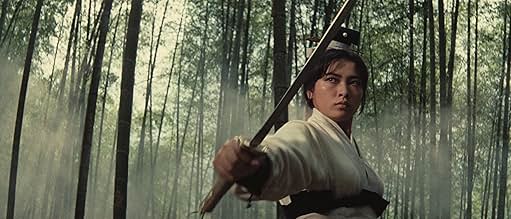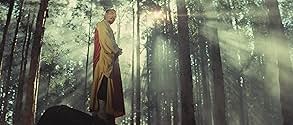Una dama fugitiva que huye de los funcionarios corruptos del gobierno se alía con un pintor poco ambicioso y unos hábiles monjes budistas.Una dama fugitiva que huye de los funcionarios corruptos del gobierno se alía con un pintor poco ambicioso y unos hábiles monjes budistas.Una dama fugitiva que huye de los funcionarios corruptos del gobierno se alía con un pintor poco ambicioso y unos hábiles monjes budistas.
- Premios
- 2 premios ganados y 1 nominación en total
- Dirección
- Guionistas
- Todo el elenco y el equipo
- Producción, taquilla y más en IMDbPro
Opiniones destacadas
Aside from the philosophical points, ZEN also scores strongly in establishing mood, suspense, and fascinating visuals. The Jiang Hu in this film feels incredibly authentic, and the rich mise-en-scene is refreshing compared to the limited Shaw Bros studio offerings. I loved the photography throughout; it beautifully captures the spiritual wonder of ancient Orient. In framing still shots, King Hu chiefly employs medium and medium close-ups, mounting his camera at an upward angle so we can always see beyond the characters, perhaps to suggest existence of higher wisdom.
One observation I would like to propose is that although ZEN is probably a milestone in Chinese cinema, it would be a minor masterpiece compared to the best works from 60s Japan. The lush photography and haunting images from KWAIDAN come to mind as a comparison. No doubt, King Hu also learned a few tricks from the likes of Kurosawa, such as pointing his camera at the sun which occurs frequently in ZEN.
[9/10]
Critics of Occidental country always ignore the genre movie. It is why by exemple, we never saw "Ninkyo Eiga" from Japan, but it is the moste populare genre in the 60-70 era. When a director like Sergio Leone made too much succes, they can't ignore him. But in general, they try to put their own idea of the each country's cinematography on the dictionnary. Japan are a zen country who made slow movie like Ozu (althought Ozu try to made movie like American with Japanese things).
This is why the history of cinema are full of injustice. King Hu are one the great injustice. Yes, he made wu xia pian, a martial art genre movies. Swordplay movie in fact.
But is movies are a perfect mechanic, an exemple of editing. Hu made is own editing and like the piano play by Glenn Gould, we recognise his style when you pay attention of editing.
Hu dont want to use "wire" or special effect. He want use "editing" and camera to suggest anythings.
A Touch Of Zen are a gem. But i understand, it is maybe too much asian for the american country. All the first alf of the movie are talk and slow pacing. But the others alf are action, action and action. I dont know who want to watch that. Intellectual who love serious movies will love the first alf but maybe they just think acyion are too stupide. Same thing for the teenager who love action pack.
But, if you forget all your expectation, you will be touch byééé magic of poetry. Hu made a 3 distinctive parts movie. The first focus on individuality, the second on politics and the third on religion.
The first hour focuys on a naive scholar who discover strange yhing happen in the village where he live whit his old mothers. Suspens and mystery are the substance of this part.
The second show politics manipulation and the substance of war. This is the Hu tradionnal part. We are in Dragon Inn Gate, Fate Of Lee Khan or all the politics corruption things. A lot of martial arts.
The third part introduce us in the things of spirit. Hu show us a personn face to himself, the society and the spiritual....
But dont epect the spiritual journey like American movies. It his a King Hu movie. Ellipse and short cut are always where you dont expect and the focus always where you never goes....
A great movie.
Despite the epic length, it doesn't feel like a traditional epic. It more felt like two - or maybe even three - plots sort of smooshed together. And on top of that, each third of the film is very distinct. The first third has no action and is sort of like a period drama/mystery. The second third is more straightforward martial arts fare, feeling very similar to another of King Hu's films, Dragon Inn (which isn't necessarily a bad thing). The final third retains the action but takes thing in a really interesting surreal/spiritual/maybe even psychological direction. It's hard to put into words, but it leaves an impact.
I wouldn't call this poorly written, but the distinctive acts and more than one plot all combined together did create something of a disjointed feeling. It didn't make the movie harder to get through, as I only realised it wasn't entirely cohesive right at the end, but it's worth mentioning. The first third might have been a tad slow, too. But after an hour, there's no point where it feels like things drag.
Thankfully everything else is close to perfect. For starters, it's visually stunning. It has some of the best lighting I think I've ever seen, with night scenes looking realistically dark (without things being impossible to see), and all the scenes during the day are just gorgeous. All the great landscapes help, too.
The action satisfies and all the performances and characters are quite good. Very good music, too. On a rewatch I might not be bothered by some of those unusual screenplay decisions, but even with that minor criticism, this is still an amazing movie, and probably among the best martial arts movies I've ever seen.
Its panoramic nature sequences have not only esthetic value, but are also symbolically relevant. In fact if one wanted to do this, it would be possible to interpret the whole movie as an allegory of human existence. Fortunately there is really no need to get out the heavy guns of symbolism and artistic value to convince oneself that Hsia Nu is a great movie. It is gripping and entertaining, amusing and serious, and infused with a pathos hardly ever encountered in European (or American) movies. Pathos of course is something difficult to handle, but the director and cast of Hsia Nu manage it very well. The film has its deliberate light moments, but it never invites laughter at its moments of pathos.
Of course we are talking here about a martial arts movie. And indeed, the fighting sequences are brilliantly done - there definitely has been no progress since 1969 - but there is not only that. There is in fact not all that much fighting if one considers that this is a three hour film, and the fights do not carry the plot. In some sense Hsia Nu resembles more a Japanese samurai drama than what we more customarily associate with the Hong Kong and Taiwan martial arts genre.
The plot is very long and complex - though perfectly understandable, and even logical - therefore I do not see any real interest in retelling it here. Suffice to say that it contains most principal human emotions: loyalty and treason, love and revenge, hunger for happiness and for...enlightenment. The acting is brilliant, and especially a more masterly 'great master' character, a monk in Hsia Nu, would indeed be difficult to find in any martial arts movie.
If anybody is not convinced by the merit of the martial arts genre and just wants to give it a sole and unique chance, then this is the movie that might convinced such a snob that cinematographic 'art' is not necessarily grey, quiet and slow, but can be colourful, vibrant and full of pathos.
It is over three hours long; the first hour is mainly scene-setting and not much happens, but this just adds to the impact. All you could want in a film is here - tension, action, arty filmwork, a kind of love interest, action, beautifully choreographed fights, intrigue, action, comedy, philosophy.... and a monk who is so pure that when he is wounded he bleeds.... well, you'd better see for yourself what he bleeds.
A must-see (if you have three hours to spare).
¿Sabías que…?
- TriviaDirector King Hu had a full village constructed for the opening half of the movie, and then left it alone for nine months to give it a weathered look.
- ErroresThe film is set in the 14th century AD. However, the Gu family have maize (corn) drying outside their house - this crop is American in origin and did not reach China until the 16th century.
- Citas
Ku Shen Chai: Have you seen Miss Yang, the lady who lives here?
General Shih Wen-chiao: No, I'm blind.
Ku Shen Chai: Forgive me.
General Shih Wen-chiao: Miss Yang and her mother are gone.
Ku Shen Chai: Mr. Shih! She said you should run for your life too. Do you know where she went?
Ku Shen Chai: I have to find her!
[Shih pulls out a sword as two soldiers fly down from the sky and attack, but are quickly killed in a few brief strokes of the sword]
Ku Shen Chai: Mr. Shih! Mr. Shih, who are you really?
General Shih Wen-chiao: I'm not blind, that's for sure.
- Versiones alternativasA Touch Of Zen was originally released in Taiwan in two parts with a total running time of 3 hours 20 minutes. However, the bamboo forest sequence which ended part one was reprised at the beginning of part two, adding over 20 minutes to the total running time. When the two parts were combined by King Hu without any repeated scenes in 1975, the resulting total time was 3 hours. The 2015 4K restoration from the original negative runs 2 hours 59 minutes.
- ConexionesFeatured in La amenaza (1977)
Selecciones populares
- How long is A Touch of Zen?Con tecnología de Alexa
Detalles
- Fecha de lanzamiento
- Países de origen
- Idioma
- También se conoce como
- A Touch of Zen
- Locaciones de filmación
- Taroko National Park, Hualien, Taiwán(monastery and river canyon)
- Productoras
- Ver más créditos de la compañía en IMDbPro
- Tiempo de ejecución3 horas 20 minutos
- Mezcla de sonido
- Relación de aspecto
- 2.35 : 1
Contribuir a esta página



